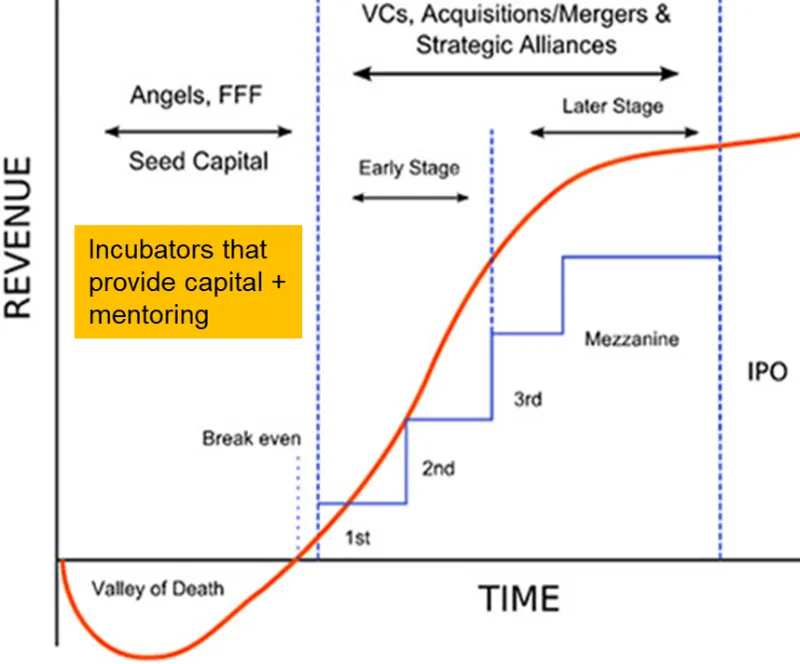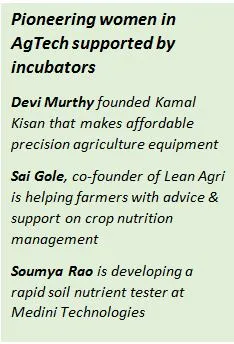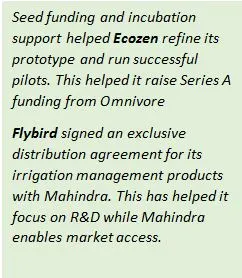How is the Indian agritech sector getting fired up?
Beyond financing, a critical ingredient is support and guidance on how to build the business. This is where a growing tribe of incubators are tilting the balance in favour of the entrepreneurs.

News of large funding rounds in the agri-technology sector is rare. AgroStar, RML Agtech and Sammunati early this year were the standouts, raising millions.
But, the number of such ventures attracting investor and corporate attention is increasing, with innovations gaining acceptance faster. Not only is it because the huge untapped potential in the farming sector is attracting more entrepreneurs, but it is also due to stronger support from the ecosystem.
The government is catalysing agri- entrepreneurship with programmes like the Agri-Udaan Accelerator and the Agri Grand Challenge. The CGTMSE (Credit Guarantee Fund Trust for Micro and Small Enterprises) is spurring banks to lend at highly affordable rates to startups. MNCs and domestic corporates working in related sectors increasingly want to tap into local innovations and support early stage entrepreneurs.

Beyond financing, a critical ingredient is support and guidance on how to build the business. This is where a growing tribe of incubators are tilting the balance in favour of the entrepreneurs.
Villgro, a-IDEA, ABI-ICRISAT and state agriculture university incubators are a few that are focused on agribusiness, helping ventures navigate the so-called Valley of Death. Other sector-agnostic incubators like Startup Oasis, IIMC Innovation Park, IIT Kanpur SIIC and KIIT TBI are getting increasingly interested in AgTech ventures.
The Valley is particularly difficult to navigate because of the unique challenges presented by the sector. Most entrepreneurs are handicapped by a customer base that is geographically and behaviourally separated from them. Business cadence is set by seasons and cash flows can get lumpy. Go-to-market strategies get to be as important as the product offering itself. Often the proverbial last mile ends being a mile too far to bridge.
A good business incubator can help bridge that gap.
Seed funding

Mentoring and technical assistance
Engineering and electronics design, AI, image recognition and data analytics, robotics, multi spectral analysis, biochemistry. These are a sample of technologies that agritech ventures are using to build their offerings. But without strong consumer and market insights, their solutions can end up chasing problems that do not exist. Through a happy coincidence there has been a recent surge in corporate leaders wanting to make a social impact and mentor social enterprises.
Good business Incubators attract highly skilled mentors and match them with deserving entrepreneurs. In addition, the incubator can provide support in crucial areas like legal, intellectual property rights and financial planning, either through in-house expertise or through its network of professional services companies. Such networks get the entrepreneur access to top quality specialised skills. And the incubator makes it affordable for the venture.
Business development and networking

The right incubator helps the agritech venture stress test go-to-market strategies. Partner networks get the entrepreneur early access to high value customers. The incubator’s business connections win the all-important first B2B customer.
Finding the right incubator for you
All incubators have an online application form. But, before that understand their incubation philosophy. What kind of startups are they supporting? Talk to these startups. Look out for pitch contests. Attend agritech focused conventions such as Villgro’s Unconvention to network with relevant industry experts.
Building a successful agritech venture demands a lot from a person. And then some more. Getting the right incubator early on can speed up the journey and make it less lonesome. This breed of Agritech incubators do not provide co-working space but immense intellectual leverage. Make the most of the large-hearted support that they provide.











